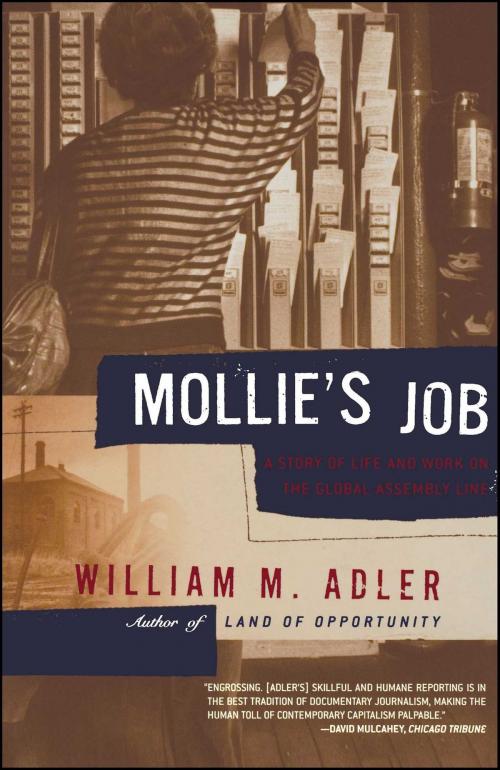Mollie's Job
A Story of Life and Work on the Global Assembly Line
Business & Finance, Nonfiction, History| Author: | William M. Adler | ISBN: | 9780743219129 |
| Publisher: | Scribner | Publication: | February 28, 2001 |
| Imprint: | Scribner | Language: | English |
| Author: | William M. Adler |
| ISBN: | 9780743219129 |
| Publisher: | Scribner |
| Publication: | February 28, 2001 |
| Imprint: | Scribner |
| Language: | English |
Following the flight of one woman's factory job from the United States to Mexico, this compelling work offers a provocative and fresh perspective on the global economy -- at a time when downsizing is unraveling the American Dream for many working families.
Mollie's Job is an absorbing and affecting narrative history that traces the postwar migration of one factory job as it passes from the cradle of American industry, Paterson, New Jersey, to rural Mississippi during the turmoil of the civil rights movement to the burgeoning border city of Matamoros, Mexico.
This fascinating account follows the intersecting lives and fates of three women -- Mollie James in Paterson, Dorothy Carter in Mississippi, and Balbina Duque in Matamoros, all of whom work the same job as it winds its way south. Mollie's Job is the story of North American labor and capital during the latter half of the twentieth century and the dawn of the twenty-first. The story of these women, their company, and their communities provides an ideal prism through which William Adler explores the larger issues at the heart of the book: the decline of unions and the middle class, the growing gap between rich and poor, public policy that rewards companies for transferring U.S. jobs abroad, the ways in which "free trade" undermines stable businesses and communities, and how the global economy exploits workers on both sides of the border.
At once a social and industrial history; a moving, personal narrative; and a powerful indictment of free trade at any cost, Mollie's Job puts a human face on the political and market forces shaping the world at the dawn of the new millennium and skillfully frames the current debate raging over future trade agreements.
By combining a deft historian's touch with first-rate reporting, Mollie's Job is an unprecedented and revealing look at the flesh-and-blood consequences of globalization.
Following the flight of one woman's factory job from the United States to Mexico, this compelling work offers a provocative and fresh perspective on the global economy -- at a time when downsizing is unraveling the American Dream for many working families.
Mollie's Job is an absorbing and affecting narrative history that traces the postwar migration of one factory job as it passes from the cradle of American industry, Paterson, New Jersey, to rural Mississippi during the turmoil of the civil rights movement to the burgeoning border city of Matamoros, Mexico.
This fascinating account follows the intersecting lives and fates of three women -- Mollie James in Paterson, Dorothy Carter in Mississippi, and Balbina Duque in Matamoros, all of whom work the same job as it winds its way south. Mollie's Job is the story of North American labor and capital during the latter half of the twentieth century and the dawn of the twenty-first. The story of these women, their company, and their communities provides an ideal prism through which William Adler explores the larger issues at the heart of the book: the decline of unions and the middle class, the growing gap between rich and poor, public policy that rewards companies for transferring U.S. jobs abroad, the ways in which "free trade" undermines stable businesses and communities, and how the global economy exploits workers on both sides of the border.
At once a social and industrial history; a moving, personal narrative; and a powerful indictment of free trade at any cost, Mollie's Job puts a human face on the political and market forces shaping the world at the dawn of the new millennium and skillfully frames the current debate raging over future trade agreements.
By combining a deft historian's touch with first-rate reporting, Mollie's Job is an unprecedented and revealing look at the flesh-and-blood consequences of globalization.















